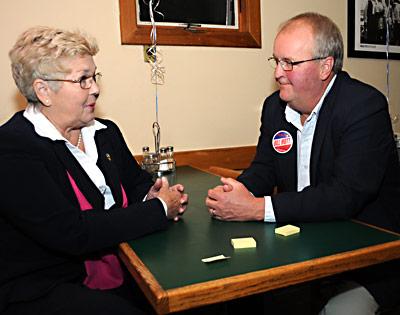Of E-Mails and Ethics in Town Politics
Of E-Mails and Ethics in Town Politics
East Hampton Town Democrats have called upon the Town Ethics Committee to investigate Len Bernard, the town’s budget officer, charging that he has engaged in political campaigning from his Town Hall office, using his phone, computer, and taxpayers’ time to conduct political business.
In the wake of Republican accusations against the Democratic candidate for town supervisor, Zach Cohen, criticizing his involvement in the town’s finances, Jeanne Frankl, chairwoman of the East Hampton Democratic Committee, distributed a release inveighing against Mr. Bernard for sending e-mails to the press cataloging a correspondence with the state comptroller.
“This is what Zach Cohen has been talking about all during his campaign,” Ms. Frankl wrote. “The budget office is being run by a political operative and not a financial professional with a nonpartisan approach to managing the town’s finances. Mr. Bernard has used the influence of his official role as the town’s budget officer in an attempt to harm Zach Cohen’s campaign.”
Following allegations made by Mr. Cohen against the outside auditing firm Nawrocki Smith, which was working with the state comptroller as well as several town officials in untangling the town’s finances, Mr. Bernard wrote Ira McCracken, a chief examiner for the office of the State Comptroller, in May, asking if someone from his office had ever sent a letter to Zachary Cohen saying that Mr. Cohen was correct in one of his criticisms of Nawrocki Smith.
“Apparently he is telling various political party officials that he has a letter from the comptroller acknowledging he was correct in some problem he pointed out to the comptroller’s office,” Mr. Bernard wrote. “I have many correspondences from Dave Tellier at Nawrocki Smith about Mr. Cohen’s assertions, and none of them say he was correct on anything. . . .”
Mr. McCracken’s response, which came back on that same day and which lies at the crux of the dispute, stated that the comptroller never sent Mr. Cohen any such correspondence and asked Mr. Bernard to “please keep us updated regarding Mr. Cohen’s assertions.”
“We weren’t politicizing this,” said Mr. Bernard on Tuesday. “It wasn’t until [Mr. Cohen] sent something out townwide saying he was a ‘financial analyst’ that I sent an e-mail to Mr. McCracken and attached the flier. I said, ‘You wanted to be aware, you asked me to do this, here it is.’ ”
Mr. Bernard said he had a “fiduciary responsibility” to the town and added that he had been asked personally by Mr. McCracken to keep him abreast of Mr. Cohen’s claims, a request he took “very seriously.”
“I don’t care if you’re a Democrat or a Republican,” Mr. Bernard said. “My background is, you’re working for the people and the town.
“If this was a political maneuver or a vendetta, why wouldn’t I have run to somebody with this e-mail before?” he added. “I’m not making allegations. I’m just doing my job and keeping the controller informed like he asked me to do.”
Ms. Frankl wrote in an e-mail that while East Hampton does not bar town employees from using town facilities or time for political activity (unlike Southampton), she believes in the “common understanding . . . against the misuse of government property for partisan purposes.”
She noted that New York State has a policy “regarding the need to separate political campaign activities by state employees from the conduct of official state business.”
Mr. Cohen said it could not be assumed that the exchanges with the comptroller’s office were the only ones Mr. Bernard undertook in connection with local politics. “It wouldn’t be an honest investigation unless they went through all his e-mails, maybe starting from when I was nominated.”
The Democrat also wants to know what combing through campaign literature has to do with Mr. Bernard’s role as a budget officer.
“Sending e-mails to the press sure looks like campaigning to me,” he said. “What does keeping the state comptroller informed have to do with sending [the press] e-mails? If Len is acting as a confidant of the comptroller, it is a violation of trust and it’s a political action to send all [the correspondence] to the news media. There is no other interpretation. If he truly was concerned purely for the comptroller’s sake, it would have stayed between them. It was a misunderstanding and we resolved it. And it should have stayed that way.”
In a town board work session on Tuesday morning, Supervisor Bill Wilkinson weighed in on the controversy, supporting Mr. Bernard, whom he said was acting according to the state comptroller’s instructions. While Councilman Dominick Stanzione expressed concern about burdening the ethics committee with political affairs, Mr. Wilkinson said he was “fine with submitting it.”
There are “a ton of details that will come out,” he said. “We’ve sheltered a whole bunch of them.”
Mr. Wilkinson said Mr. Cohen’s characterization of himself as a financial analyst was “a fabrication,” and “now the fabrication is being turned on the person who highlighted the fabrication. I am clearly going to stand up and come to the defense of Len Bernard . . . I welcome any ethics board review.”
With reporting by Heather Dubin


